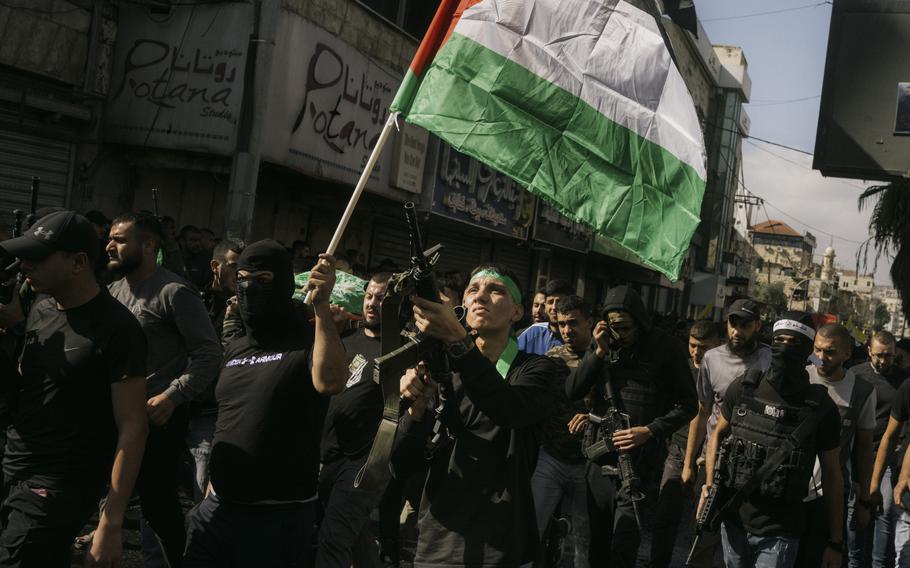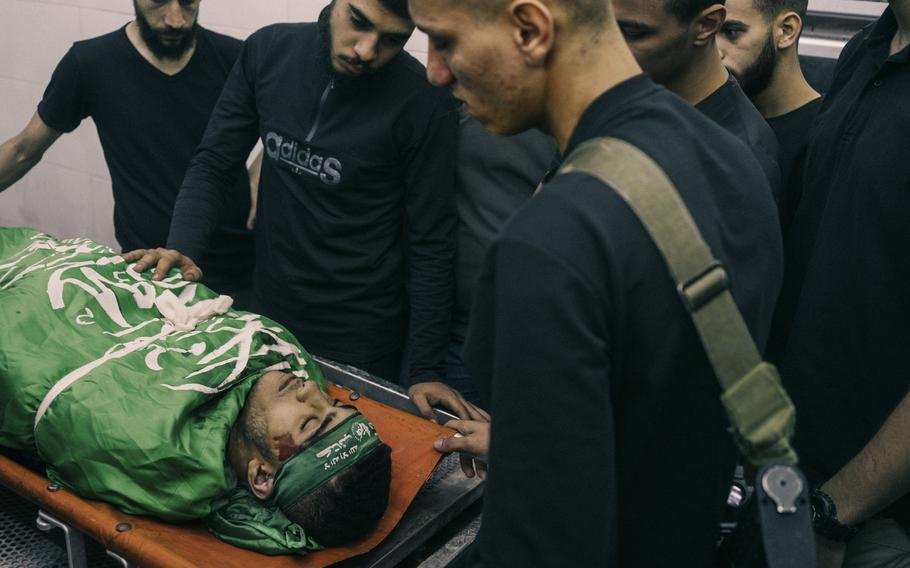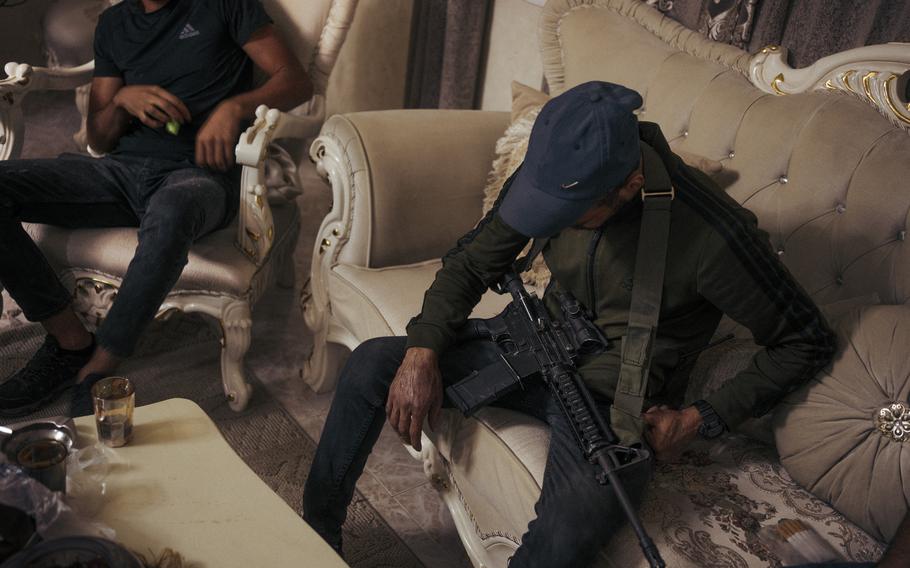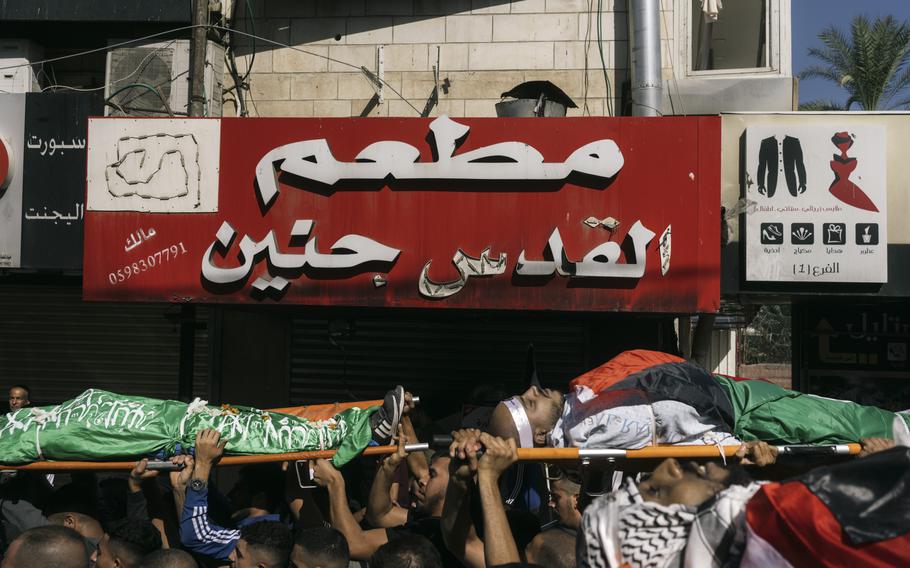Middle East
Israeli drone strikes in Jenin signal new strategy, risk militant blowback
The Washington Post November 13, 2023

The funeral for several Hamas militants, including Mohammed Fayyadh, 19, on Friday, Nov. 10, 2023, in the Jenin refugee camp in the West Bank. (Lorenzo Tugnoli/for The Washington Post)
JENIN REFUGEE CAMP, West Bank — As the bodies of slain fighters were laid out one by one, the morgue was thick with the silence of men who could not find words.
Several of the dead wore green or black headbands, signifying their allegiance to Hamas or other militant factions that Israeli forces had targeted. With 14 dead, the battle around Jenin’s refugee camp on Nov. 9 was the deadliest in decades.
The Israeli army, deployed on multiple fronts and focused on the grinding war in Gaza, is relying increasingly on mass arrests and air power in the West Bank, though the strategy risks re-energizing the militant groups it seeks to contain. Nearly 400 Palestinians — fighters and civilians — have been killed across the territory this year by soldiers and settlers.
After another Israeli drone strike on a mosque in late October, Mohamed Fayyadh, a young fighter with scars on his hands, laid out the future for camp residents as he saw it.
“In America children drink a cup of milk and go to school, but we don’t have that here. For children in the camp, it’s just the resistance,” he told The Washington Post on Oct. 23, gesturing to the gun slung on his back, decorated with the banner of his militant group, the Army of God.
He said he was 19 and carried himself with a teenager’s bravado. “We are ready for a strike to hit us at any moment,” he said.
When asked if that worried him, he smiled and shook his head.
The Jenin refugee camp was one of 19 established in the West Bank after hundreds of thousands of Palestinians were driven from their homes during the 1948 Arab-Israeli war. Today, it is a maze of unpaved streets and concrete homes. Its residents have been neglected by the ruling Palestinian Authority and discriminated against by the occupying Israeli authorities, who preside over a system that rights groups have described as apartheid.
Jenin’s reputation as a bastion of Palestinian militancy was sealed in 2002, at the height of the second intifada, when the camp was the scene of one of the conflict’s bloodiest battles. Photos of slain fighters stare out from the walls of almost every block, some faded, some new.
The camp has given rise this year to a new generation of fighters — who have launched attacks on Israeli troops and civilians — and has been the site of increasingly bloody military raids. After a major operation by Israeli forces in July, which left at least 12 Palestinians dead and 100 wounded, the streets of Jenin had been unusually quiet, experts said.
“The Palestinian Authority and Israel had managed to either co-opt, arrest or kill most of the [militants], and so for a while, you didn’t see guns everywhere,” said Tahani Mustafa, the senior analyst on Palestinian affairs at the International Crisis Group.
With its most recent raid, she said, “Israel has basically managed to reignite a spark.”
In a statement, the IDF said it had used aircraft as part of its Nov. 9 operation in Jenin as troops on the ground entered the camp in search of explosives. “As part of the operation, terrorists shot and threw explosives at our forces who responded by shooting at them,” it said.

Hamas militants gather at the Jenin morgue in the West Bank on Friday, Nov. 10, 2023, in preparation for the funeral of their comrade Mohammed Fayyadh, 19. (Lorenzo Tugnoli/for The Washington Post)
Inside the city’s main hospital, a doctor said Israeli forces had fired on paramedics as they tried to reach the wounded. In the ICU, a 31-year-old medic, Sabreen al-Rashad, drifted in and out of consciousness as her mother stood stricken at her bedside.
Fayyadh was killed in the raid. The following day, his body lay in the morgue of Jenin’s hospital, a green Hamas headband now covering a head wound. His best friend stood over him, his face contorted with emotion, fingers gripping an assault rifle.
“He is the lucky one, he’s a martyr,” the man said, trying not to cry. “This is my wish too.”
The fighter, who was 18, spoke on the condition of anonymity to protect his safety. “Most of the dead yesterday were killed by drones,” he said.
The apparent shift in Israel’s West Bank security strategy is a product of its escalating war in Gaza, where more than 11,000 Palestinians and 42 Israeli soldiers have been killed.
Israel’s operations here since Oct. 7 have been marked by what authorities frame as preemptive arrests on security grounds and an increased use of drone strikes in areas where militants operate, experts say.
At least 1,570 Palestinians have been detained across the West Bank since Oct. 7, according to the IDF. Rights groups put the number higher and describe many of the detentions as arbitrary.

Islamic Jihad militants in the Jenin refugee camp in the West Bank on Nov. 1, 2023. (Lorenzo Tugnoli/for The Washington Post)
Israel’s military “doesn’t want to stretch themselves thin,” said Joe Truzman, a research analyst at FDD’s Long War Journal. “If something happens in the north, they don’t want to have troops tied up in the West Bank that they may need.”
The drones, in particular, he said, are meant to send a “message of deterrence,” in a place where airstrikes were unheard of until recently. But in the communities being hit, there is rising anger and vows of retribution.
“Israel is picking up its operations, and that’s exactly what has ended up leading to the reestablishment of these [militant] groups,” Mustafa said. “It’s the same context, it’s so cyclic.”
By turning to drone strikes, Israel is able to avoid significant casualties, at a time when the nation is still reeling from the Hamas assault that killed 1,200 people. In the July operation, an Israeli commando was killed by friendly fire.
“If all of Israel entered the camp, each one of us could put down one battalion, so they are launching missiles,” Fayyadh’s friend said.
He shouldered Fayyadh’s body on a stretcher through the town’s dilapidated streets Friday, a crowd gathering around him as he approached the family home. Female relatives buckled with grief when they saw him.
A 24-year-old fighter from the Islamic Jihad group said the camp has prepared itself for ramped up Israeli operations. More tarps have been hung between buildings to obscure the view of Israeli drones and protect those underneath. Barricades, he claimed, have been rigged with explosives.
“We close all the roads and booby trap the camp,” he said. “We have people with smart minds who can manufacture things,” he added, mentioning homemade explosives that have disabled Israeli military vehicles.
The fighter spoke on the condition of anonymity, saying he is wanted by Israel.

Bodies are carried during a funeral for several militants on Friday, Nov. 10, 2023, in the Jenin refugee camp in the West bank. (Lorenzo Tugnoli/for The Washington Post)
During a visit to the camp by Post reporters in early November, the day after a smaller Israeli raid, a group of fighters gathered at a relative’s home. They all sipped coffee. It was late afternoon, but no one had slept the night before. Israeli troops pushed up to the camp’s edge and launched at least one drone strike inside, killing three people, according to the Palestinian health ministry.
Text message warnings from Israel to camp residents had become more frequent, they said, warning them to stay away from known fighters and to avoid the area during clashes.
“This is for your safety and security,” one of the messages read.
Hamas had hoped its assault on Oct. 7 would trigger a wave of violent Palestinian resistance across the region, current and former intelligence officials and counterterrorism experts have told The Post. So far, there has been little sign of a new uprising in the West Bank. But fighters here say they are ready.
“From Jenin camp, we send a message to Gaza,” the Islamic Jihad fighter said. “We are squarely with you and we will not abandon you.”
As Fayyadh’s family tended to his body, his friend milled around outside. Occasionally, he fired into the sky between the black tarps above him.
There were wails from inside, and the air smelled of gunpowder. He said he was angry. He missed his friend. “If I wasn’t in this situation, I would live happy,” he said. “We love life, don’t think we don’t. I had a lot of ambition.”
Both he and Fayyadh had wanted to travel, he said, but Israeli restrictions had made it hard to even leave the city. “If there is no security, then there is no life. The only way to take that back is by force.”

A militant from Islamic Jihad holds a homemade bomb in the Jenin refugee camp in the West Bank on Nov. 1, 2023. (Lorenzo Tugnoli/for The Washington Post)